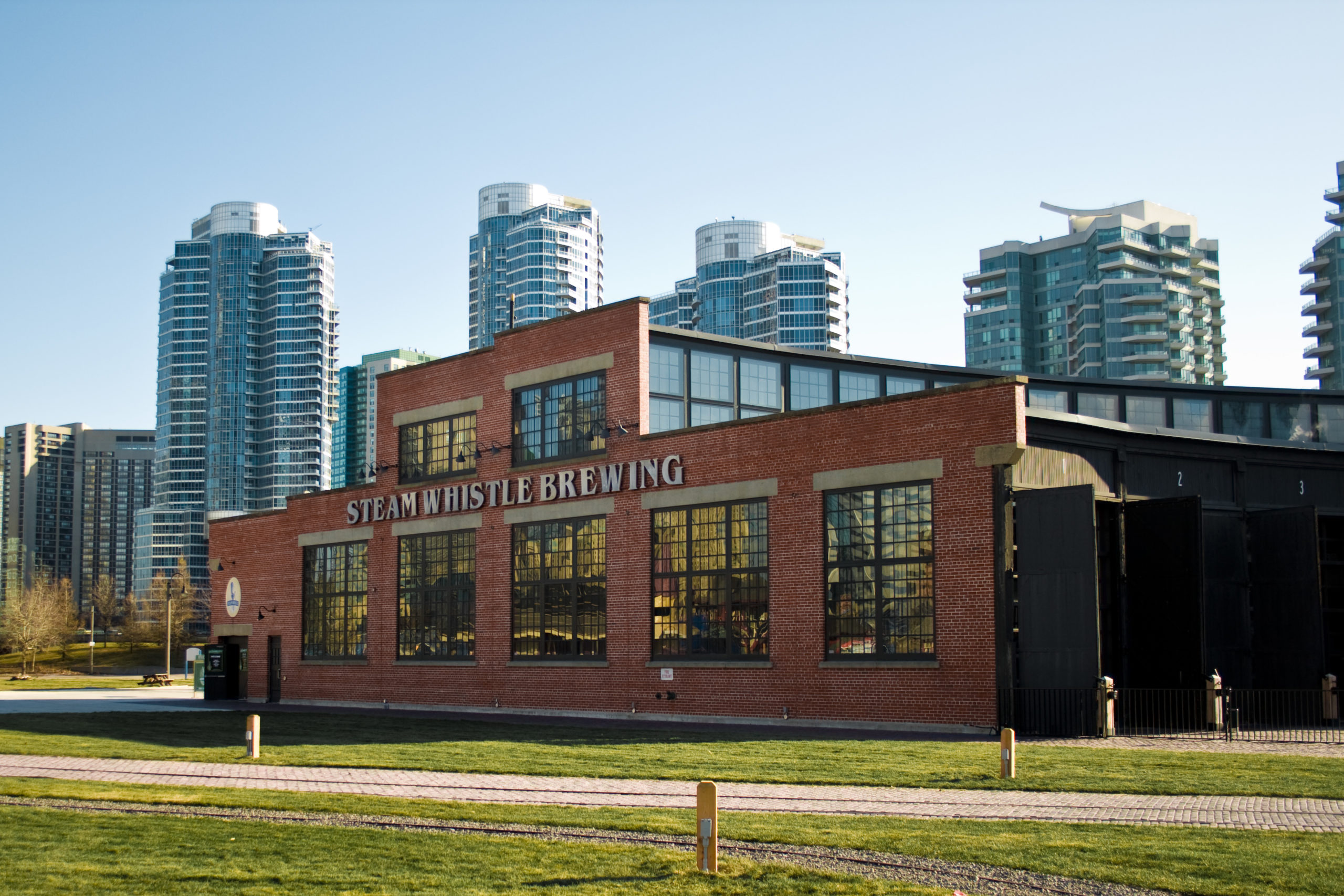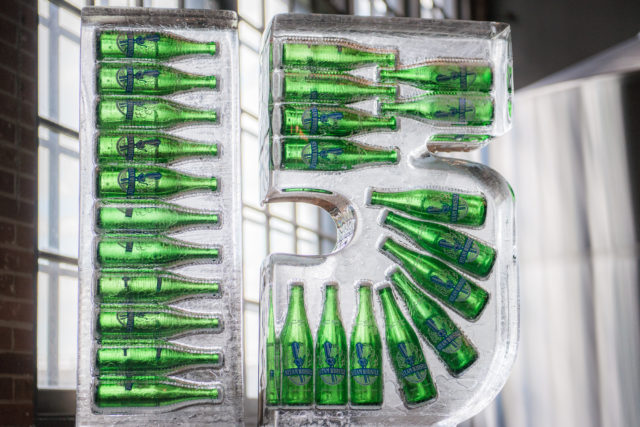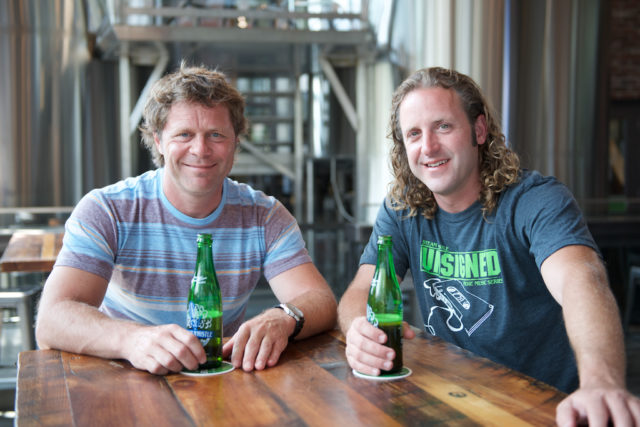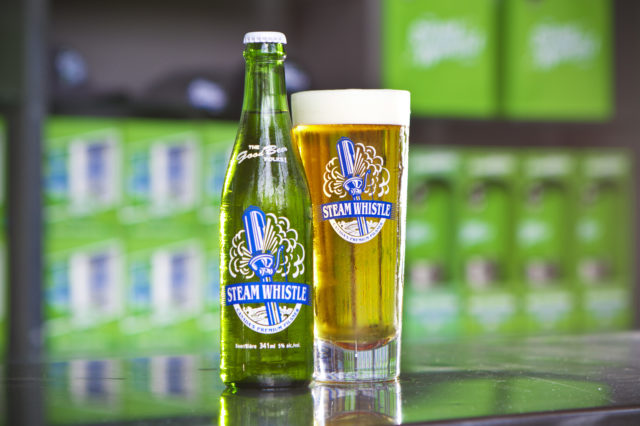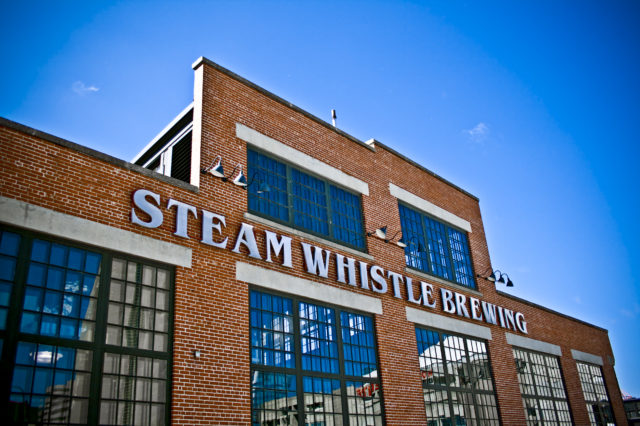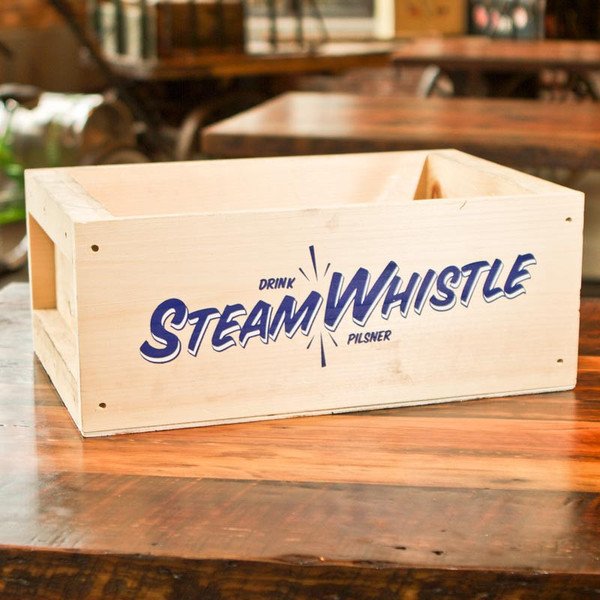-
Headquarters -
255 Bremner Blvd, Toronto, Ontario, M5V 3M9
-
Year established -
1998
-
NAICS -
312120 - Breweries
-
Major expansions -
2005, 2012, 2014
-
Employees -
190
-
Exports -
N/A
-
Download -
Steam Whistle Brewing
Over the past two decades, Steam Whistle Brewing has grown from a dream hatched by the fireside into one of Canada’s largest independent breweries.
Algonquin Provincial Park (Algonquin), located in the heart of Ontario, is the setting of countless Canadian stories. From the inception of Roots Canada Ltd., to the millions of campers who leave with stories to tell around the campfire for years to come, there is something about Algonquin that inspires. Perhaps one of the greatest stories to emerge from Algonquin is that of Steam Whistle Brewing (Steam Whistle): a classic tale of hardship turned into success.
The acquisition of Upper Canada Brewing Company by Sleeman Breweries Ltd. resulted in company-wide layoffs. Amongst those laid off were Greg Taylor, Cam Heaps, and Greg Cromwell, who had all taken work in other industries but were not content with their current work. With their futures uncertain, they embarked upon their annual canoe trip to Algonquin, where they first discussed their joint idea of starting their own brewery. After leaving Algonquin, the three started meeting weekly to draw up the business plan for the new brewery, originally called “Three Fired Guys.”
Armed with a plan and the staff to execute it, the three founders began searching for investors and a facility to house the brewery.
This proved to be a pivotal stage in the company’s inception: investor confidence was extremely high, given the sound business plan and the experienced staff—so high, in fact, that Taylor, Heaps, and Cromwell were able to attain a bank loan before completing financing from private investors. Ultimately, “Three Fired Guys” managed to raise $4.2 million in financing.
The only question that remained was where to set up shop. This was answered in the form of the John Street Roundhouse, an abandoned CP Rail locomotive repair facility in the heart of downtown Toronto that was sold to the city for the incredibly affordable price of $1. After declaring it a National Historic site, the city fell in love with the idea of returning the building to its industrial roots when approached by the three founders. However, before production could start, branding had to be finalized and rolled out to packaging. To counter negative connotations associated with the name “Three Fired Guys,” and drawing upon the ideas of the John Street Roundhouse’s industrial roots and the traditional end to a workday, Taylor, Heaps, and Cromwell opted for a new name: Steam Whistle.
In March 2000, the first bottle of Steam Whistle Pilsner rolled off the line. Since then, the company has remained true to its mission of being the most respected premium beer in Canada. To achieve this status, Steam Whistle focuses on four important elements that are crucial to its continued success: quality, specialization, location, and corporate social responsibility.
Steam Whistle’s quality stems from a belief in using only the best ingredients and traditional brewing methods; this means investing heavily in all-natural ingredients and spring water to ensure that customers receive the best-tasting beer. The transformation of ingredients into an award-winning brew, is completed under the watchful eye of a credentialed Master Brewer, further increasing Steam Whistle’s quality. With a singular focus on perfection, Steam Whistle is the only brewery in Canada to produce only one beer (their premium pilsner). Focusing all resources towards one premium product allows Steam Whistle to put forth the best beer possible, while streamlining efforts to achieve some efficiencies. This strategy of quality over variety translates into the best experience for customers, and has been the driving force behind Steam Whistle’s growth.
By staying true to the team’s motto—“Do one thing really, really well”—Steam Whistle has enjoyed much success.
Having taken 16 years to grow across Canada, it now brews roughly 95,000 hectolitres each year, making it the largest Canadian craft brewery in both sales volume and revenue. Driving these sales is Steam Whistle’s customer base, which is more suitably categorized through psychographics (meaning that the customers’ values, beliefs, and lifestyles are significant influences on their beer selection).
Who is more inclined to drink Steam Whistle? Craft beer drinkers are more likely to be independent thinkers with a social consciousness, and are willing to try new products in their search for quality craftsmanship. These individuals do not necessarily have a high income level, yet they choose to spend their money on valued products that are aligned with their ideals and bring a sense of reward. For many, Steam Whistle is a gateway beer that will entice the regular big brand drinkers to explore what craft breweries have to offer, and after tasting the difference, they may find it hard to go back.
Putting forth a quality product coupled with cultivating a “Good Beer Folks” culture (based on passion, craftsmanship, and social responsibility) has resulted in a loyal following and steady double-digit organic growth for Steam Whistle year after year. Recent changes in Ontario’s alcohol distribution has allowed grocery stores to offer beer products, which has proved extremely advantageous for Steam Whistle and other craft breweries. Historically, breweries could only distribute their products through The Beer Store (TBS) and/or the Liquor Control Board of Ontario (LCBO). Because the Beer Store is owned by corporate giants Molson, Sleeman, and Labatt, craft breweries are at an immediate disadvantage and received minimal exposure. This resulted in only 4% of sales in Ontario to craft producers. The new alcohol retailing changes now require TBS to provide a minimum of 20 per cent shelf space to craft producers. However, grocery stores take a different approach. Realizing the recent popularity of craft beer, they give 50 per cent shelf space to craft breweries, which translates into 55 per cent total beer sales being generated from craft beers.
A huge part of Steam Whistle’s success is undoubtedly due to its employees. All employees are responsible for delivering the brand experience to consumers; this requires they be adequately trained to understand Steam Whistle’s goals and vision. If employees are able to embody the culture of Steam Whistle, every interaction with consumers has the power to influence their perception—essentially creating the company’s marketing foundation. Steam Whistle’s workforce consists of 190 employees (70 of which are part time), all with a variety of backgrounds and skill sets. Steam Whistle’s strong reputation means they easily attract a large pool of applicants from which to select loyal staff members.
Another driver of Steam Whistle’s success is its excellent corporate social responsibility, displayed through its frequent sponsorships and community interactions. Sponsoring 800 cultural, community and charitable events across Canada and placing its own knowledgeable staff on site has proved to be Steam Whistle’s most effective marketing tool. Standing together to promote other craftspeople (such as indie musicians and entrepreneurs) has ignited a craft revolution, and paved the way for Steam Whistle to become the leader in the craft brew world. In these ways, the company has been able to penetrate one of the country’s most monopolistic markets by staying true to its vision and keeping a singular focus on quality brewing.
For more information about Steam Whistle Brewing, visit their website.
Published: July 20, 2016
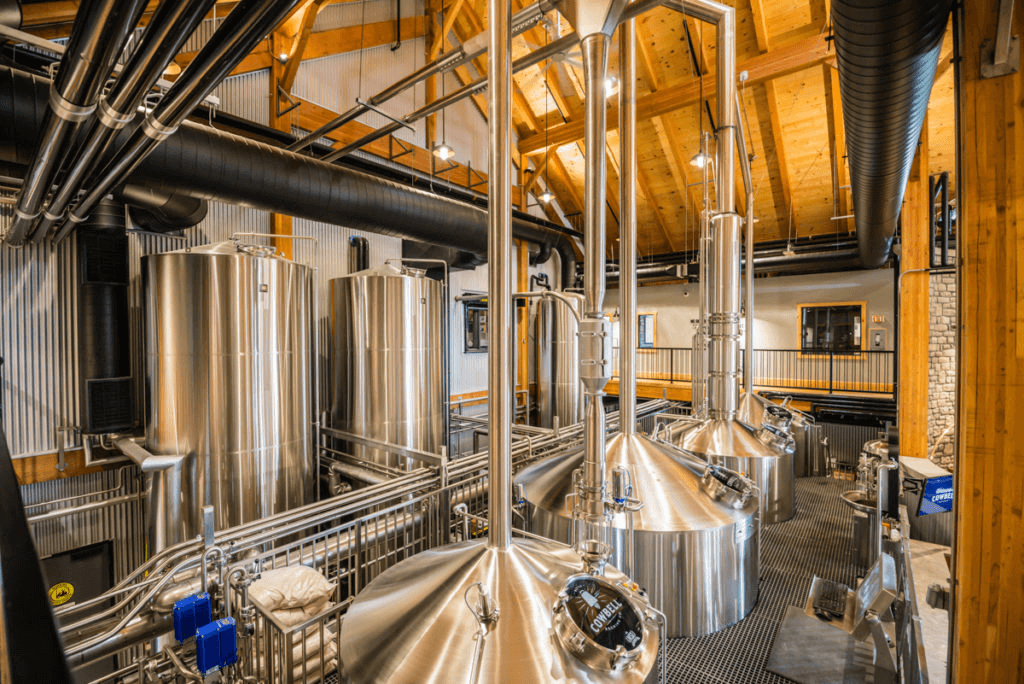
Cowbell Brewing
Cowbell is a destination craft brewery, which features a full restaurant, several event spaces, and the Cowbell General Store. It is the first carbon-neutral brewery in North America and the first closed-loop brewery in the world.

Hiram Walker & Sons
Hiram Walker & Sons is Ontario’s sole “grain-to-glass” distillery. The company produces Vodka, Rum and Canadian Whisky.
